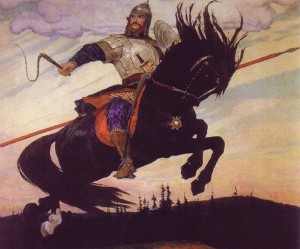 Nowhere I could find the real pictures of the Ryabinins great Russian poets, epic story tellers. This is why it is shown here a piece of an artist’s imagination of old Russian story tellers. To attune your ear to the Russian ancient melody it is included also the performance of folk Russian group “Belorybitsa”, song Рябина (Ryabina)
Nowhere I could find the real pictures of the Ryabinins great Russian poets, epic story tellers. This is why it is shown here a piece of an artist’s imagination of old Russian story tellers. To attune your ear to the Russian ancient melody it is included also the performance of folk Russian group “Belorybitsa”, song Рябина (Ryabina)
On December 3, 1871 the newspaper “Russian World” wrote: “There is no doubt that to listen to bylinas from lips of the story teller (rapsoda) is a case, rare and rather interesting, drew attention to enormous public who stood on foot in the hall because of lack of seats. In front of the listeners at a table in an armchair, having put his both hands on arm rests, the old man of sturdy build, with a short growth of grey beard and yellow hair sat. It was Trofim Grigorievich. At first sight he seemed bent over in the way he walked, his outward appearance was one which impresses with strength and endurance. Dressed in sibirku, his face with deeply set eyes and all his outlooks show a respectable and serious kind.
With his beautiful, profound, live, cheerful voice the tempo of which was at times faster, at other times the harmony was broken reminding us of something age-old, forgotten by our generations… “Ilja Muromets and Nightingale the Robber” started approximately as follows:
Whether from here or there perhaps from the city of Murom,
Oh hey, maybe from the village of Karacharovo,
A good fellow was traveling on a long, long road,
He stopped in the early morning near Murom,
And by noon he kept on his way to the capital city of Kiev,
Oh hey, meanwhile he approached a nice city of Chernigov,
Whether at that city of Chernigov either close or far,
He was put on force trial by something pitch-dark,
And hey, pitch-dark was a black raven…
13 texts had been written down, among them: “Ilja and Idolishche”, “Ilja and Guelder-roses-tsars”, “Ilja in Quarrel with Prince Vladimir”, “Dobrynja and Dragon”, “Dobrynja and Marinka, “Volga and Mikula”, ” The Good Fellow and a Thin Wife” etc.Characters of Russian folklore
Listening to the bylinas we are plunging into the special epic world, both fantastic and real. After Trofim Grigorievich Ryabinin’s performance he was handed over a monetary compensation of the amount being 100 silver roubles, and Grand Duke Konstantin Nikolaevich had awarded the singer really with a “princely” gift the silver cup executed in old Russian style, Silver medal, 1872 -official seal.
The National Archives read:
“The Sovereign the Emperor in Response to the report of the Minister of the Internal Affairs, Its desire of Imperial Highness of the Sovereign of Grand Duke Konstantin Nikolaevich, about rewarding the well known rapsoda and the story teller of Russian bylinas, the peasant of Olonetsky province Trofim Ryabinin, is more graciously deigned to welcome on the 18-th day of February to Ryabinin the Silver Medal with an inscription “for useful” for carrying on a neck on to a Stanislavsky tape.” In Match 1872 the Olonetsky governor G. Grigoriev had called T. Ryabinin to Petrozavodsk and personally handed the award over to him.
Trofim Grigorievich Ryabinin was born on April 15, 1801 (27-th April-new style) in v. Dmitrovsky (Gamitsky-the present name). Very early he had lost his parents and had been brought up in the “country world”, “world” means godfathers, matchmakers, godmothers, aunts, uncles, “daleekieedaleeekiee”.
In 1820 he married to Darya Pankratovna Klopovaja, came to her parents’ house as a “primak”. Later he had built up his own house, the couple had 16 children.Черный баран (Black Ram)
On February 14, 1885 Trofim Ryabinin had died. According to his son Ivan, “very much driven was: went, went and had died a safe death”. He had left imperceptibly in a non-existence, in immortality. He had been buried in Kizhi at the church yard, about Pokrovsk Churches.
His son Ivan Trofimovich Ryabinin became a successor of a poetic talent. He adopted the basic part of repertoire, 15 bylinas, almost literally repeated the texts of his father. The epic songs were performed in front of grateful listeners of St. Petersburg, Moscow, Odessa, Sofia, Belgrade, Vienna, Prague, Warsaw.
Anton Arensky (1861-1906) was inspired to compose Fantasia on Themes by I.T. Ryabinin, Op.48 for piano and orchestra, and one bylina from Novgorod had been the inspiration behind Rimsky-Korsakov’s opera “Sadko”.
In this Ryabinin Fantasia, perhaps modeled on comparable works by Liszt, Arensky chose two themes borrowed from the collection of Trofim’s son Ivan (1845-1910) The first theme (Andante sostenuto) is a gentle, lyrical melody in E minor presented first by the piano and then by the orchestra with embellishments from the soloist. The second theme is a march-like theme in D minor (Allegretto) with a “scotch snap” rhythm, the florid style is often used, the sounds of the gusli (zither) so closely associated with the Russian bard tradition.
Nowadays 208 years later we are celebrating the date of the birth of the first great Russian poet among the best story tellers Trofim Grigorievich Ryabinin, the talented peasant fisherman from the northern Onega region of Russia, the founder of the dynasty of bards who kept the oral tradition of the ancient bylinas (epic songs) alive.
How very interesting to learn of such a wonderful storyteller, one of the few to keep the old tradition alive.
Hi, Rudy and family!
It is most gratifying that you have read, understood and appreciated the column in “Reading and Discussion Club” about the peasant poet Trofim Ryabinin, for many he is obscure and unknown, always overshadowed by the classical poets and writers of Russian literature. In spite of all this he speaks of life in Russia of the common man, his sufferings, joys, spirituality and the unbroken tediousness and monotony of provincial rural Russian life. By his poems he opened a window on this world, so that the readers get a glimpse of the real Russia, not nobility, not royalty as it may be interesting for some but just for simple people as we all are.
Sincerely yours,
Valentina